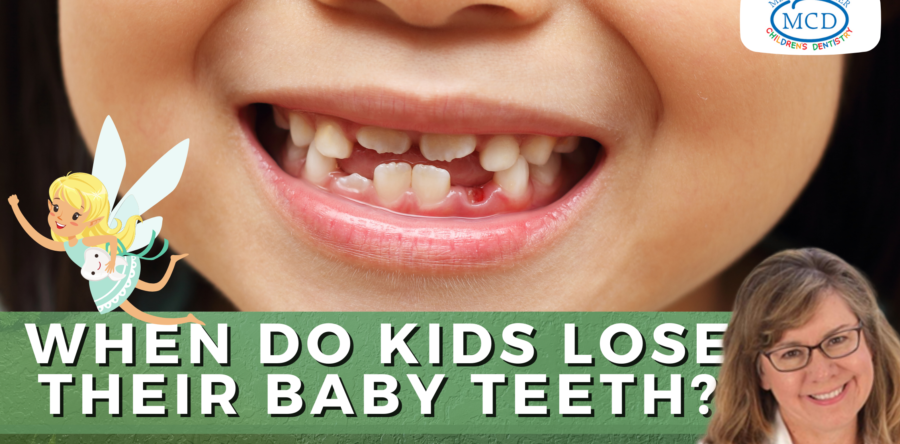
Many parents wonder, "when will my child lose their baby teeth"?
The truth is that there's not an exact moment! In fact, children lose various teeth at different ages as they grow and their adult teeth begin to form beneath.
Many parents don't know what's going on underneath the gums at this time. As the child's incoming adult tooth beings to erupt, this will cause the roots of baby teeth to be reabsorbed. Over time, their teeth become looser, until there is only a small amount of tissue still holding them in place. This process typically goes unnoticed by the child until the tooth is finally loose. Surprisingly, kids usually don't mind once they learn the benefits of a friend like the Toothfairy!
The Order They Fall
While there isn't an "exact" time when a child may lose certain teeth, most children lose their baby teeth in a similar order. This is based on how we naturally develop as humans. It is not uncommon for children to lose teeth at their own pace, so this is only a rough estimate.
- 6-7 Years Old: Most children start to lose their first set of baby teeth around 6 years old. It starts with their first molars becoming loose.
- 7-9 Years Old: This is typically when children loose their incisors. These are the middle teeth which are often referred to as their "front teeth". Usually by around 8 years old, these teeth will fall out.
- 9-10 Years Old: This is around the time when many childrens' lower canines will be lost. These are the pointed teeth on the bottom.
- 10-12 Years Old: Pre-Molars and Molars, the teeth in the back of your child's mouth. They are shed between ages 10 and 12, however, some children will lose their lower second molar as late as 13. However, most children should have all there permenant molars in by 13 (with the exception of their wisdom teeth).
- 11-13 Years Old: This is usually when your child's lower, second molars will be lost and replaced by adult teeth.
- 17-21 Years Old: The last teeth to come in are your child's third molars, also know as their wisdom teeth. It is estimated that a third of the population don't develop wisdom teeth at all. Yet, the American Association of Oral and Maxillofacial Surgeons states that “about 85% of third molars will eventually need to be removed.”

What If They Fall Out Too Early Or Too Late?
Most children don't have problems with their baby teeth falling out "too soon or too late." Although, there are exceptions. While baby teeth are known to fall out naturally, they can also be lost due to injuries and even gum disease or cavities. We all know that life as a kid comes with some risk for injuries. "Knocked out" or "chipped" baby teeth are one of the most common, especially for athletes. It might surprise some parents to learn those baby teeth still require the same care as adult teeth. Poor dental hygiene can lead to “premature tooth loss,” and even cause cavities in the incoming permanent teeth as well.
If a child hasn’t lost any teeth by age 8, or if adult teeth erupt before the baby teeth have fallen out, we may need to schedule a visit to be sure everything is alright. Most children have little to no issues with their teeth falling out or coming in! There are some times when we may need to help a tooth come out, and that's okay. If you feel comfortable helping a super loose tooth out at our own home, a little twist and pull usually does the trick. Some children can do it on their own too. Other times we even have parents swing by our office for a little assistance! We are always here to help!
What Can Parents Do To Ease The Process?
Even though society has normalized and exposed children to the process of losing teeth from a young age, actually experiencing it can still be uncomfortable for them. The idea of your teeth falling out when you're just figuring out the world is kind of scary, especially if you've never experienced it before. We have a couple of simple solutions for our patients' parents to help them navigate this time...
- Try to start conversations about it early to get them comfortable with the idea and ease any fears prior.
- Be supportive throughout the process. Some kids face fears and discomfort around the idea of losing teeth. This is normal. A little Tender, Love, and Care from family goes a long way.
- It can also help to have an older sibling, cousin, or even a friend of your child's who has already explain it. Little ones have their own ways of connecting and reassuring each other that works too!
- Mainy children's TV shows cover oral health and even losing baby teeth in at least one of their episodes, especially classics that have been on air for several seasons. Some of these helpful shows include Baby Shark, Lama Lama, Arthur, Sponge Bob, Daniel Tiger, and Peppa Pig. We also love Digital Shows, such as PBS Be Smart's episoe "Where Do Teeth Come From?" and ABS's Imagine This Podcast episode "Why Do We Lose Our Baby Teeth?".
- Another fun, interactive way to help them feel better is with some happy sing-a-longs about loose teeth such as CoComelon's "Loose Tooth Song." This one is definitely a favorite in our office!
- Bring your little one on by and we would love to help in any way we can, from talking them through it to helping with a loose tooth or two little along the way.
- Having a way to celebrate after makes a big differences, whether it's the toothfairy or a treat from family for reaching another milestone it can! The excitment around folklore like the Toothfairy is a fun distraction that almost makes kids look forward to losing a few teeth. However, there are many ways you can celebrate this moment of growth!
We believe one of the best ways we can support our patients and their families is through education and resources! This is why we want to equip our patients' parents with the dental knowledge they need to know to help their children achieve good, lifelong oral health! If you are interested in reading more articles about losing baby teeth or scheduling an appointment with Dr. Casey, feel free to reach out today!







1 Response